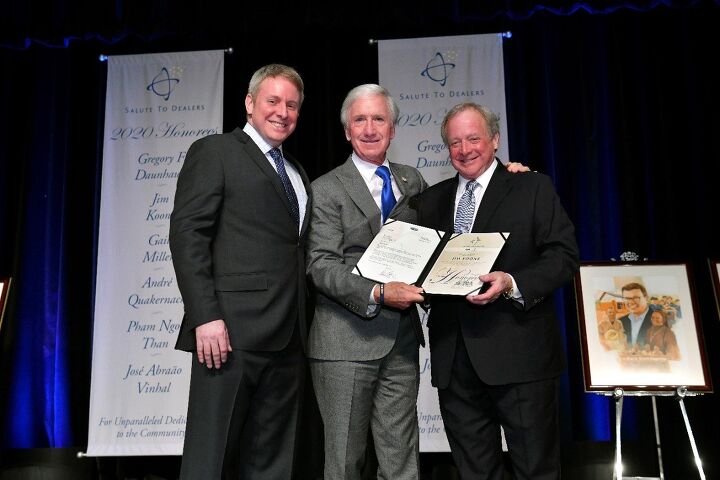Family Feud: Ford Dynasty Questioned by Investors

Ford investors are reportedly irked that Ford Motor Co. seems to be pursuing the dynasty management route by issuing elevated positions to individuals of the correct bloodline. Like it or not, Ford has been a family business for the majority of its existence, but it’s facing new scrutiny after adding 32-year-old Alexandra Ford English to the board of electric truck manufacturer Rivian and making 39-year-old Henry Ford III (great-great grandson of the big dog himself) the face of investor relations.
The Ford family currently holds the largest slice of the corporate pie, thanks to their special class of stock, and 40 percent of the voting rights. But the business faces severe headwinds, hampered by the coronavirus and a share price that’s trended stubbornly downward since 2014. This has prompted concern among longtime shareholders and split opinions on whether or not Ford should continue keeping things within the family.
We don’t know what the ultimate plan is — at least not in terms of the grooming of Henry and Alexandra as the next wave of the Ford dynasty. Bloomberg made it seem fairly clear-cut that the pair were intentionally elevated to high-level positions as part of a continued ascension to automotive royalty:
Henry Ford III and Ford English are likely years away, if ever, from assuming the uppermost leadership roles. Jim Farley, promoted March 1 to chief operating officer, is the clear heir apparent to current CEO Jim Hackett. But each is now moving through a variety of jobs at the company. Henry, known as “Sonny” among friends and family, was director of corporate strategy before taking the investor relations job. He is the son of Edsel Ford II, a board member and now a company consultant.
Ford English, the daughter of Bill Ford, assumed a corporate strategy position similar to the one previously held by her cousin, while also being named to the board of Rivian Automotive, the electric-truck maker in which Ford has taken a significant ownership stake.
Each declined an interview request through a Ford spokeswoman.
Their seasoning is similar to what their fathers received while rising in the ranks in the 1980s and ’90s. Bill and Edsel Ford landed on the company’s board of directors in 1988 while still in their 30s and agitated successfully for more prominent roles as directors. Edsel eventually rose to president of Ford’s highly profitable credit unit before retiring in 1998, and Bill became company chairman in January 1999 and served as CEO from 2001 to 2006.
Both received Ivy League educations prior to earning their business degrees, working in fields outside of the automotive landscape before swiftly rising through the ranks at Ford Motor Co. This raised concerns of nepotism that are both difficult to prove and fairly normal among large companies. Still, the matter came up during Thursday’s shareholder meeting via a proposal to strip the family of its special class of stock and swap to a one-share, one-vote arrangement. The suggestion garnered a support rate of 35 percent support — a slight improvement over last year’s 34 percent.
The concern is that family-controlled entities often perform worse on the stock market because you’re often gambling with new leadership. Rather than finding someone competent from the outside, you’re grooming someone from within the family who hopefully has enough of their forebear’s DNA to not sink the business.
“That’s why we don’t have Kings and Queens anymore — it’s a roll of the genetic dice,” said Nell Minow, vice chair with ValueEdge Advisors, a shareholder advocacy firm. “We’ve seen in companies like Motorola and Anheuser Busch that it hasn’t worked out to continue to pass the baton from generation to generation.”
You could just as easily make the claim that relations to the founding members of a business have more reason to want to see a company thrive. The Ford family’s track record also hasn’t been all been that bad. Imperfect, to be sure, but comparatively successful at avoiding drama when you consider other automotive dynasties throughout history.
That’s assuming the Fords are actually being groomed for something greater, which Minow argued is probably the case. Henry Ford III isn’t being given a cushy position where he can quietly earn a paycheck until his inheritance comes in. He’s having to work as a go-between for investors and the business — a task we do not envy.
“Investor relations is the best place that you can put somebody that you’re trying to groom for leadership because they are going to be dealing with complaints all the time,” Minow said. “It will give him a real reality check.”
Meanwhile, Ford English has a comparatively easy position on the Rivian board, though it’s not an unimportant placement. She also worked a stint in the automaker’s mobility arm, giving her a taste for the industry. “I was originally hesitant to join Ford because I don’t have a technical background and it’s a company built upon engineering,” she said in 2018. “But I knew what I could bring to the company and I was very aware of those skills.”
What do you think? It’s not like Ford has a history of elevating familial relations without some skin in the game, but it does have a history of promoting them. Are the subset of investors attempting to uncouple that legacy on the right track, or is this all just a distraction from Ford’s real problems?
[Images: Ford Motor Co.]

A staunch consumer advocate tracking industry trends and regulation. Before joining TTAC, Matt spent a decade working for marketing and research firms based in NYC. Clients included several of the world’s largest automakers, global tire brands, and aftermarket part suppliers. Dissatisfied with the corporate world and resentful of having to wear suits everyday, he pivoted to writing about cars. Since then, that man has become an ardent supporter of the right-to-repair movement, been interviewed on the auto industry by national radio broadcasts, driven more rental cars than anyone ever should, participated in amateur rallying events, and received the requisite minimum training as sanctioned by the SCCA. Handy with a wrench, Matt grew up surrounded by Detroit auto workers and managed to get a pizza delivery job before he was legally eligible. He later found himself driving box trucks through Manhattan, guaranteeing future sympathy for actual truckers. He continues to conduct research pertaining to the automotive sector as an independent contractor and has since moved back to his native Michigan, closer to where the cars are born. A contrarian, Matt claims to prefer understeer — stating that front and all-wheel drive vehicles cater best to his driving style.
More by Matt Posky
Latest Car Reviews
Read moreLatest Product Reviews
Read moreRecent Comments
- ToolGuy First picture: I realize that opinions vary on the height of modern trucks, but that entry door on the building is 80 inches tall and hits just below the headlights. Does anyone really believe this is reasonable?Second picture: I do not believe that is a good parking spot to be able to access the bed storage. More specifically, how do you plan to unload topsoil with the truck parked like that? Maybe you kids are taller than me.
- ToolGuy The other day I attempted to check the engine oil in one of my old embarrassing vehicles and I guess the red shop towel I used wasn't genuine Snap-on (lots of counterfeits floating around) plus my driveway isn't completely level and long story short, the engine seized 3 minutes later.No more used cars for me, and nothing but dealer service from here on in (the journalists were right).
- Doughboy Wow, Merc knocks it out of the park with their naming convention… again. /s
- Doughboy I’ve seen car bras before, but never car beards. ZZ Top would be proud.
- Bkojote Allright, actual person who knows trucks here, the article gets it a bit wrong.First off, the Maverick is not at all comparable to a Tacoma just because they're both Hybrids. Or lemme be blunt, the butch-est non-hybrid Maverick Tremor is suitable for 2/10 difficulty trails, a Trailhunter is for about 5/10 or maybe 6/10, just about the upper end of any stock vehicle you're buying from the factory. Aside from a Sasquatch Bronco or Rubicon Jeep Wrangler you're looking at something you're towing back if you want more capability (or perhaps something you /wish/ you were towing back.)Now, where the real world difference should play out is on the trail, where a lot of low speed crawling usually saps efficiency, especially when loaded to the gills. Real world MPG from a 4Runner is about 12-13mpg, So if this loaded-with-overlander-catalog Trailhunter is still pulling in the 20's - or even 18-19, that's a massive improvement.




































Comments
Join the conversation
Worked for Toyota. Didn't work for Wang Labs. We shall see.
Investors should refuse to buy stock in companies which issue "special voting rights" shares to certain people. Ford was one of the first to pull this trick decades ago, Facebook/Zuckerberg have done it in modern times. In fact, IMO the SEC should simply make this practice illegal. But without that hammer, investors can and should just say no. Why should a bloodline determine who gets top jobs at Ford, or anywhere else?